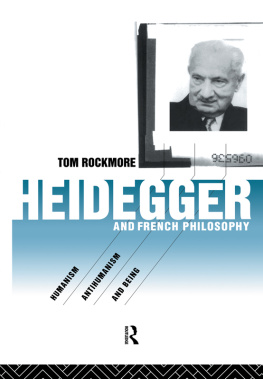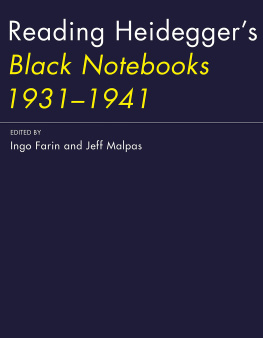Heidegger Martin - Ponderings XII-XV : Black Notebooks 1939-1941.
Here you can read online Heidegger Martin - Ponderings XII-XV : Black Notebooks 1939-1941. full text of the book (entire story) in english for free. Download pdf and epub, get meaning, cover and reviews about this ebook. City: Bloomington, IN, year: 2017, publisher: Indiana University Press, genre: Religion. Description of the work, (preface) as well as reviews are available. Best literature library LitArk.com created for fans of good reading and offers a wide selection of genres:
Romance novel
Science fiction
Adventure
Detective
Science
History
Home and family
Prose
Art
Politics
Computer
Non-fiction
Religion
Business
Children
Humor
Choose a favorite category and find really read worthwhile books. Enjoy immersion in the world of imagination, feel the emotions of the characters or learn something new for yourself, make an fascinating discovery.
- Book:Ponderings XII-XV : Black Notebooks 1939-1941.
- Author:
- Publisher:Indiana University Press
- Genre:
- Year:2017
- City:Bloomington, IN
- Rating:5 / 5
- Favourites:Add to favourites
- Your mark:
- 100
- 1
- 2
- 3
- 4
- 5
Ponderings XII-XV : Black Notebooks 1939-1941.: summary, description and annotation
We offer to read an annotation, description, summary or preface (depends on what the author of the book "Ponderings XII-XV : Black Notebooks 1939-1941." wrote himself). If you haven't found the necessary information about the book — write in the comments, we will try to find it.
Ponderings XII-XV : Black Notebooks 1939-1941. — read online for free the complete book (whole text) full work
Below is the text of the book, divided by pages. System saving the place of the last page read, allows you to conveniently read the book "Ponderings XII-XV : Black Notebooks 1939-1941." online for free, without having to search again every time where you left off. Put a bookmark, and you can go to the page where you finished reading at any time.
Font size:
Interval:
Bookmark:

Ponderings XIIXV
Studies in Continental Thought
EDITOR
JOHN SALLIS
CONSULTING EDITORS
Robert Bernasconi
John D. Caputo
David Carr
Edward S. Casey
David Farrell Krell
Lenore Langsdorf
James Risser
Dennis J. Schmidt
Calvin O. Schrag
Charles E. Scott
Daniela Vallega-Neu
David Wood
Martin Heidegger
Ponderings XIIXV
Black Notebooks 19391941
Translated by
Richard Rojcewicz
Indiana University Press
This book is a publication of
Indiana University Press
Office of Scholarly Publishing
Herman B Wells Library 350
1320 East 10th Street
Bloomington, Indiana 47405 USA
iupress.indiana.edu
Published in German as Martin Heidegger Gesamtausgabe 96: berlegungen XIIXV (Schwarze Hefte 19391941), edited by Peter Trawny
2014 by Vittorio Klostermann GmbH, Frankfurt am Main
English translation 2017 by Indiana University Press
All rights reserved
No part of this book may be reproduced or utilized in any form or by any means, electronic or mechanical, including photocopying and recording, or by any information storage and retrieval system, without permission in writing from the publisher.
The Association of American University Presses Resolution on Permissions constitutes the only exception to this prohibition.
The paper used in this publication meets the minimum requirements of the American National Standard for Information SciencesPermanence of Paper for Printed Library Materials, ANSI Z39.481992.
Manufactured in the United States of America
Library of Congress Cataloging-in-Publication Data
Names: Heidegger, Martin, 1889-1976, author.
Title: Ponderings : Black notebooks / Martin Heidegger ; translated by Richard Rojcewicz.
Description: Bloomington : Indiana University Press, 2016 | Series: Studies in Continental thought | Includes bibliographical references.
Identifiers: LCCN 2015035416| ISBN 9780253020673 (vol 1 cloth : alk. paper) | ISBN 9780253020741 (vol 1 ebook)
Subjects: LCSH: Heidegger, Martin, 18891976Notebooks, sketchbooks, etc.
Classification: LCC B3279.H48 S36213 2016 | DDC 193dc23
LC record available at https://lccn.loc.gov/2015035416
1 2 3 4 522 21 20 19 18 17
CONTENTS
Translators Introduction
This is a translation of volume 96 of Martin Heideggers Gesamtausgabe (Complete Works). The German original appeared posthumously in 2014.
The volume is the third in the series publishing Heideggers Black Notebooks. These are small (ca. 5 7 in.) notebooks with black covers to which the thinker confided sundry ideas and observations over the course of more than forty years, from the early 1930s to the early 1970s. The notebooks are being published in chronological order, and the four herein correspond to the years 19391941. In all, thirty-three of the thirty-four black notebooks are extant and will fill up nine volumes of the Gesamtausgabe.
Heidegger gave a title to each of the notebooks and referred to them collectively as the black notebooks. The first fifteen are all Ponderings. Their publication began in volume 94 with Ponderings II (Ponderings I is the lost notebook). Volume 95 included the second five Ponderings, VIIXI. The present volume with its four notebooks concludes the publication of the extant Ponderings.
As can be imagined regarding any notes to self, these journal entries often lack polished diction and at times are even cryptic. Nevertheless, the style and vocabulary are mostly formal, not to say stilted, and are seldom colloquial. This translation is meant to convey to an English-speaking audience the same effect the original would have on a German one, the degree of formality varying pari passu with Heideggers own. A prominent peculiarity of the style I was unable to render in full, however, is the extensive use of dashes. Heidegger often employs dashes not merely for parenthetical remarks but for any change in the direction of thought. Sometimes dashes separate subjects and predicates, and some dashes even occur at the end of paragraphs. Due to differences in English and German syntax, I could not include all the dashes without making for needless confusion and could not place them all at the exact points that would correspond to the original sentence. This admission is of course not meant to imply I did capture the varied styles of the notebooks in all other respects.
The pagination of the notebooks themselves is reproduced here in the outer margins. All of Heideggers cross-references are to these marginal numbers. The running heads indicate the pagination of the Gesamtausgabe edition. I have inserted myself into the text only to alert the reader to the original German where I thought it might be helpful (for example, as indicating a play on words I could not carry over into English) and to translate any Latin or Greek expressions Heidegger leaves untranslated. I have used brackets ([]) for these interpolations and have reserved braces ({}) for insertions by the editor. All the footnotes in the book stem either from me, and these few are marked as such, or from the editor and are then placed within braces.
I am grateful to an anonymous reviewer for a critique of an earlier version of this translation.
Richard Rojcewicz
Ponderings XIIXV
PONDERINGS XII
Any thinker who thinks toward a decision is moved, and consumed, by care over a plight which cannot at all be sensed in the historiologically reckoned lifetime of that thinker. The level of genuine understanding (genuine in the sense of contributing to the preparation of a decision) of the thoughts of such thinkers is measured according to the capacity for the necessary thinking out in advance to the strange and excessive demands radiating from what is unsaid in the words of those thinkers. The more essential the decision which is to be disclosively thought, all the more grows the distance between the thinker and a historiological explication by way of the tradition, and all the greater becomes the danger that the thinker will, at best, count as an exception. Yet this is the most insidious form in which something decisive is suppressed and becomes ordinary or, in other terms, becomes something already decided. Such suppression of what is decisive does in no way stem from human indolence; instead, it brings the despotism of beings qua beings to its appropriate effectivity.
Destruction is the precursor of a
concealed beginning, but devastation
is the aftereffect of an already decided
end. Does the age already stand
before the decision between destruction
and devastation? Yet we know
the other beginningknow it
in questioning(cf. pp. 7679).
This flight does not stem from human impulses; instead, the human being fleesunaware of his flightinessbecause beyng itself disappropriates him from the truth of beingbut why is this? Who might know the reason? Perhapsit is that the human being still scarcely surmises even the least of the historical domain of his essential occurrence, the domain wherein the self-refusal of beyng is the event in whose core intersect all the decisions of the things to be differentiated (God and human being, earth and world). Perhapsit is that the human being no longer wants a beginning but, instead, merely takes refuge in what follows from one.
Come to meditate: these words must be uttered at the right momentand not as a summons or a planbut rather as an already carried out leap in advance that is now to be recovered. Yet the recovery has a peculiar relation to everything essential in that it projects the recovered even further in advance, i.e., places it back into history as unsurpassable beginning. The ways and the holding sway of beyng are strangeto want to approach them means primarily to renounce historiology and its habitual mode of representation.
Next pageFont size:
Interval:
Bookmark:
Similar books «Ponderings XII-XV : Black Notebooks 1939-1941.»
Look at similar books to Ponderings XII-XV : Black Notebooks 1939-1941.. We have selected literature similar in name and meaning in the hope of providing readers with more options to find new, interesting, not yet read works.
Discussion, reviews of the book Ponderings XII-XV : Black Notebooks 1939-1941. and just readers' own opinions. Leave your comments, write what you think about the work, its meaning or the main characters. Specify what exactly you liked and what you didn't like, and why you think so.

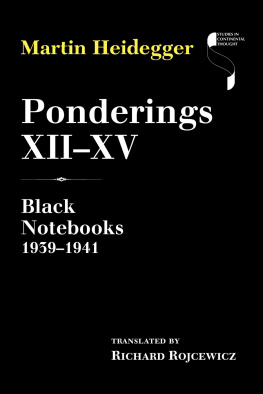

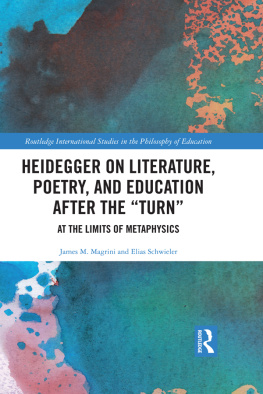
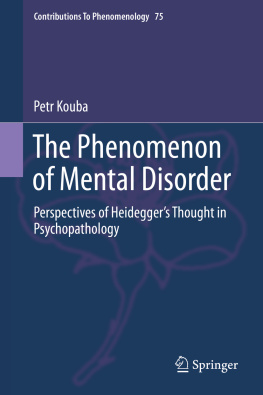
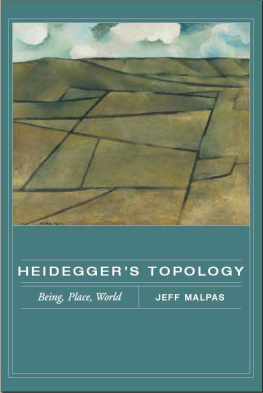
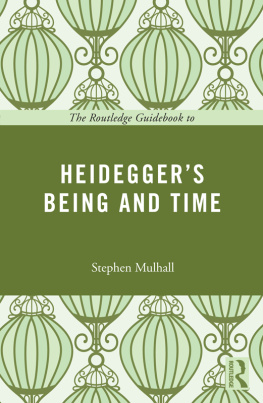
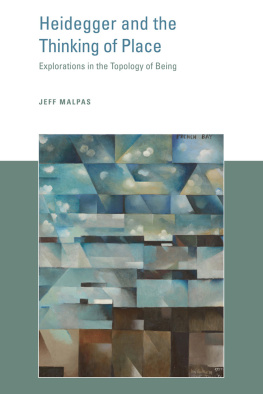

![Heidegger Martin - Ponderings. [1]: Black notebooks: Ponderings II-VI: black notebooks 1931-1938](/uploads/posts/book/212464/thumbs/heidegger-martin-ponderings-1-black.jpg)
